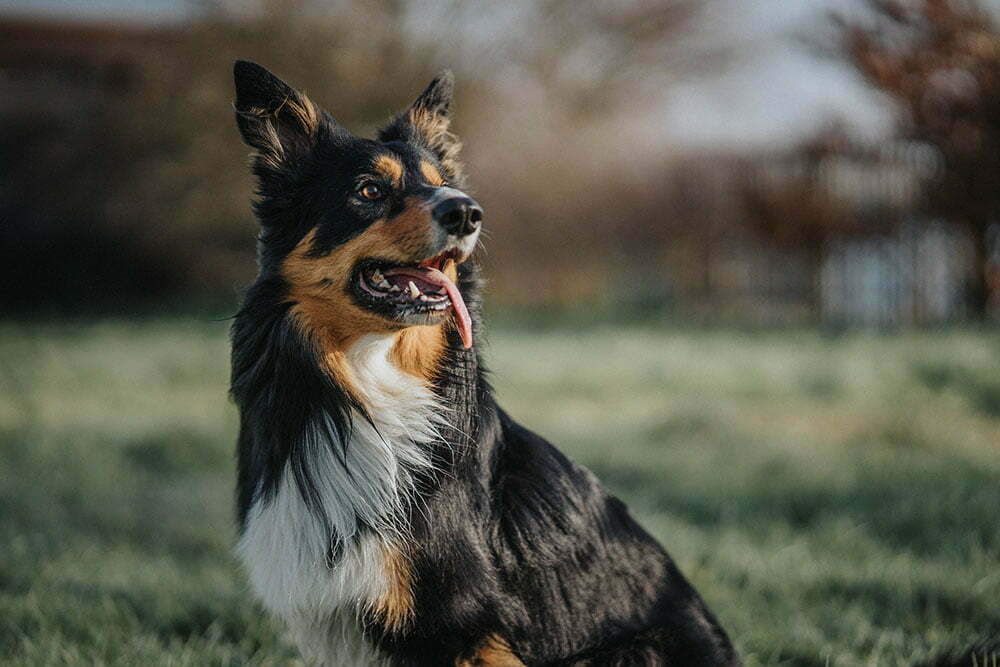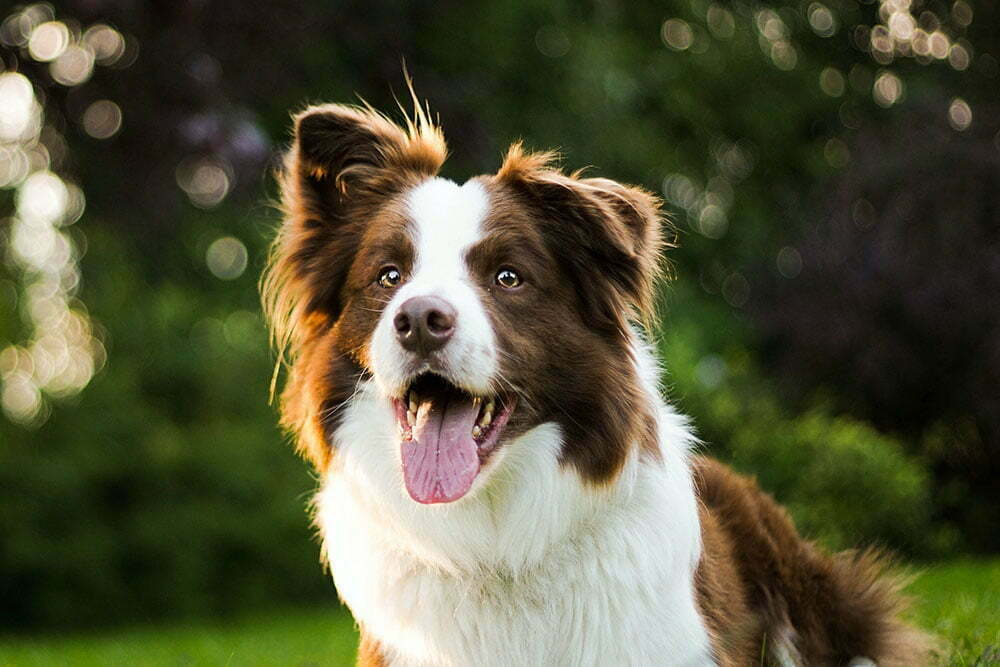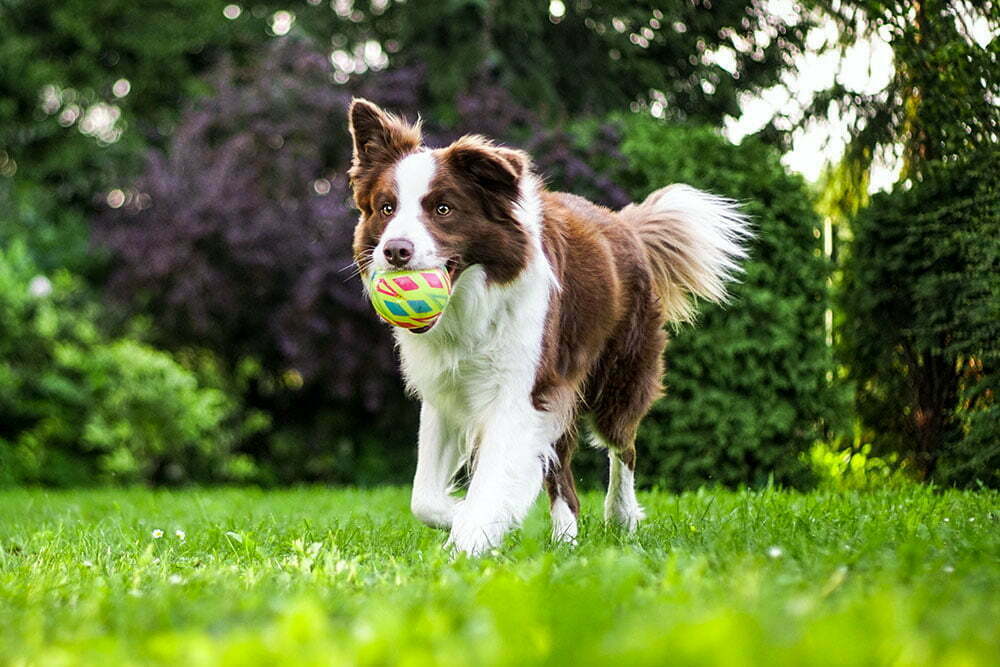If you’re considering introducing a dog into your family, it’s important to make sure that you get the right breed for you and your lifestyle.
No two breeds of dog are the same, which can make the task of finding your perfect pooch tiresome and overwhelming. Well, we’re here to help!
Have you ever considered a Border Collie? They’re loyal, friendly, and highly intelligent and can be trained to follow complex demands.
This is why they’re often the breed of choice for many farmers and livestock owners. Border Collies are often nicknamed “sheepdogs” for this reason.

This guide covers everything you’ll ever need to know about Border Collies, including how they behave, how they should be trained, what they’re able to do, their quirks, vulnerabilities, and associated illnesses.
While Border Collies can make for a perfect family pet, it’s important to note that, like every breed, they have a few tendencies which can make them less than-ideal pets in some situations.
Introducing a new pet into your home is never a decision that should be taken lightly. Being a responsible pet owner is a huge responsibility, and you’ll need to make sure that you have the means to commit to them for their whole life.
So, before you make a decision, let’s dive into the Ultimate Guide to Border Collies!
What is a Border Collie?
Border Collies were initially bred to herd and control sheep in the rugged border territory between Scotland and England. They’re famous for their fierce glare, or “eye,” with which they command their flock.
Border Collies are dogs with boundless energy, stamina, and working drive, all of which combine to make them superior herding dogs; Border Collies are still trained to herd sheep on farms and ranches all around the world — and you’ll have a difficult time trying to find a better farm dog than a Border Collie.
If you trace back the lineage of the Border Collie breed, you’ll notice that there is more than one type.
This is because they can differ slightly depending on which region of Britain they were bred in. For example, Border Collies bred in Wales are known as Welsh Collies, and those bred in Scotland are often called Scottish Collies, etc.
The modern Border Collie that we know and love today is believed to be descended from a dog bred in Northumberland, UK, at the turn of the nineteenth century, bringing us back to their border county origins.
Border Collies are highly trainable and smart dogs who thrive in a variety of canine sports such as obedience, flyball, agility, tracking, and flying disc events.
They can make excellent family pets if they get a whole lot of physical and mental stimulation.
You’ll also need to be the kind of person that is comfortable owning a dog that can occasionally outwit you. This is the breed for you if you want a loving, intelligent dog who will keep you active and on your toes.
Despite the fact that Collies have been a popular herding dogs for many years, they were not often seen as a domestic companion.
They regularly steal the spotlight during events and dog shows because of their responsiveness to hand signals and other smart tricks, but they only became widely popular in the previous century.
If you’ve ever watched a Border Collie herd sheep, you know you’re witnessing a master craftsman at work, with his concentrated stare as he approaches the sheep, his seemingly intuitive response to the shepherd’s direction, and the skilled way he guides the sheep exactly where the shepherd wants them to go.
It truly is breathtaking.
Physical Traits of the Border Collie Dog Breed
The Border Collie is a beautiful-looking dog that is well-suited to outdoor living, with bright, inquisitive eyes and a strong, defined body.
Their thicker, longer coat is weather-resistant and can be shorter and sleeker or longer and rougher, depending on how you decide to groom them.
They are easily identified by their coloring, which is typically black with white markings or any type of bicolor or tricolor combination. While they enjoy getting dirty, the good news is that their coats do not require hours of maintenance and tedious grooming regimes.
You’ll just need to brush them once a week and bath them once in a while. However, as these are very active dogs, expect them to be muddy and grubby in no time!
Perched upon their gorgeous faces are medium-sized ears that perk up when their curiosity is piqued.
You’ll also notice their deep, thoughtful eyes and broad skull. In adulthood, their powerful frames weigh between 13 and 20 kg, and a full-grown Border Collie stands between 18 and 22 inches tall.
Personality Traits of the Border Collie Dog Breed
Border Collies are often characterized as a breed by their ability to be both obedient and understanding.
They are always up for a challenge and enjoy tasks, exercise, and hard work in general. This means you’ll be on your toes all the time and have a regular pattern that includes a lot of running around.
Border Collies are fantastic with children and other pets when properly trained and socialized, which is why they make good family dogs.
They are, nevertheless, huge and demanding bundles of energy, which can lead to disruptive and malicious behavior if they are bored, unstimulated, or agitated. This is why correct and proper training is vital when owning a Border Collie, as with any other breed.

Collies have been employed as sniffer dogs and are popular at events due to their intelligence and energy. All of this will be a lot of fun if you want your dog to learn tricks and engage with you during games and walks.
Health Traits of the Border Collie Dog Breed
Border Collies are typically healthy. However, they, like all breeds, are susceptible to some health issues.
Although not all Border Collies will get any or all of these ailments, it’s vital to be aware of them if you’re thinking about getting one.
If you’re looking to buy a puppy, be sure to look for a reputable breeder who can show you health certifications for both of your puppy’s parents. Health clearances confirm that a dog has been tested and cleared of a certain condition.
Epilepsy
This neurological disorder is frequently, but not always, hereditary.
Seizures caused by epilepsy can be moderate or severe, manifesting as strange behavior (such as running furiously as if being followed, staggering, or hiding) or even falling down, limbs rigid, and losing consciousness.
Seizures are terrifying to witness, but the long-term prognosis for dogs with idiopathic epilepsy is often extremely excellent. Taking your dog to the vet for accurate diagnosis (particularly since seizures can be caused by other factors) and treatment is critical.
Allergic Reactions
Food allergies are addressed by removing specific items from the dog’s diet; contact allergies are caused by a reaction to a topical substance such as bedding, flea treatments, dog shampoos, and other chemicals; and inhalant allergies are caused by airborne allergens such as pollen, dust, and mildew.
Treatment varies depending on the reason and may involve food restrictions, medications, and environmental modifications.
Hip Dysplasia
This is a genetic disorder in which the thigh bone does not fit securely into the hip joint. Some dogs exhibit pain and lameness on one or both of their back legs, while others show no visible signs of discomfort.
(The most definite way to diagnose the condition is with X-ray screening.) Arthritis might occur in either case as the dog ages.
Dogs with hip dysplasia should not be bred, so if you’re looking to acquire a puppy, be sure the parents have been tested for hip dysplasia and are healthy.
Eye Problems
This is a hereditary disorder that causes alterations and abnormalities in the eye, leading to blindness in some cases.
These abnormalities can include choroidal hypoplasia (abnormal choroidal development), coloboma (an optic disc defect), staphyloma (sclera thinning), and retinal detachment. Collie’s eye abnormality commonly appears by the age of two years. There is no cure for this illness.
Osteochondrosis Dissecans (OCD)
Not to be confused with human OCD (obsessive-compulsive disorder), this canine orthopedic illness is most commonly caused by improper or irregular growth of the cartilage around the joints.
It is most commonly associated with occurrences in Border Collie’s elbow and shoulder joints.
It produces a painful stiffness of the joint, preventing the dog from bending his elbow.
It can be found in dogs as young as four to nine months old. Overfeeding puppy foods with “growth formula” or high-protein diets may contribute to its development.
Progressive Retinal Atrophy (PRA)
This is a group of eye illnesses characterized by the slow degradation of the retina.
Affected dogs become night-blind early in the disease; as the condition develops, they lose sight during the day. As long as their surroundings do not change, many affected dogs adjust well to their reduced or lost vision.
How long does a Border Collie live?
Border Collies have a rather long life expectancy, ranging from 10 to 17 years. Cancer, old age, and cerebrovascular disease are the top causes of death in Border Collies.
Hip dysplasia, Collie Eye, Epilepsy, Hypothyroidism, Progressive Retinal Atrophy (PRA), and Trapped Neutrophil Syndrome (TNS) are some prevalent health issues of Border Collies that are known to shorten their lives.
Early treatment and cure for these diseases are crucial to lengthen the lifespan of your Border Collie.
The oldest ever Border Collie lived to be 28 years old. Bramble, from the UK, was born on September 1st, 1975, and he passed away on March 31st, 2003. Bramble even earned himself a place in the Guinness Book of World Records.
This clearly demonstrates that with the proper nutrition and activity, this breed can live longer than typical while also taking care of any potential health problems.
Border Collies, like other breeds, are prone to a variety of health issues and dangers, which reduces their longevity. The majority of Border Collie’s health issues stem from their ancestors. Breeders can even forecast a Border Collie’s longevity based on their ancestors’ history.
How to take care of a Border Collie dog
Exercise
Border Collies are known for having a lot of energy, so getting enough exercise is essential. Most adult Border Collies will require at least 90 minutes of exercise every day.
However, this will vary based on your dog’s age, health, and overall fitness.
Working dogs and those interested in canine sports will typically get significantly more activity than pets. In contrast, puppies and senior dogs will require less exercise to safeguard their bones and joints.

It can be tempting to assume they need constant exercise if you have a Border Collie puppy.
However, we recommend not pushing them too much and keeping a close eye on them at all times to make sure they are not too exhausted. If a puppy gets too worn out, it can cause lasting damage to its health.
As your Border Collie ages, he or she will begin to slow down and require less rigorous activity.
You’ll notice indicators that your dog is slowing down, such as soreness after walks, a reluctance to go great distances, and decreased interest in that tennis ball. Take walkies at their pace and lower the intensity – a gentle stroll in the park is sufficient.
Training
The Border Collie, as a herding dog, is a diligent student with sharp intelligence. They can also bark and pinch, which is useful while herding sheep but not necessarily desired in a companion.
In addition, they are eager to run after everything that piques their interest, which can cause problems when you are out and about.
Simple commands can be taught to your Border Collie early, and results can be expected.
This also aids in the control of destructive behavior. Collies also excel at trick training, which helps keep them entertained. Things like “stop barking” will be rapidly picked up and understood.
Grooming
A farming/working Border Collie isn’t fussy and doesn’t require much maintenance to look decent.
His weather-resistant double coat requires weekly brushing to ensure that coat oils are evenly distributed and to prevent matting in the rough type.
Brushing more frequently during the shedding season is an excellent tip to reduce hair shed around the house (he sheds seasonally). Bathe him only as necessary — usually every four months or when he’s particularly unclean or smells bad.
Check for sores, rashes, or symptoms of infection such as redness, tenderness, or inflammation on the skin, nose, mouth, eyes, and feet while you groom.
There should be no redness or discharge in the eyes. Your thorough weekly examination will enable you to detect potential health issues early on.
The average price of a Border Collie
A Border Collie puppy costs around $600 on average. This is simply an estimate because the cost of Borders varies depending on factors like the breeder’s location and reputation, the dog’s pedigree or history, the litter size, and more.
Border Collies that are supposed to be petted and have complete documentation but are not show quality will cost around $600 and higher.
Prepare a budget of $1,300 to $4,500 for a quality puppy with papers, breeding rights, and outstanding ancestry. Occasionally, even more.
Working Border Collies are mature dogs who have previously received some training.
Borders can cost up to $7,500 to train. It is fairly acceptable, given breeders’ time and effort, to ensure that their canines are up to the task.
Frequently Asked Questions
Are Border Collies hypoallergenic?
No. However, the smooth-coated Collies could be considered slightly more hypoallergenic than the rough-coated Collies.
Are Border Collies suitable for first-time owners?
Border collies are a demanding breed that may be too difficult for a first-time dog owner.
Border Collies are often advised for persons with prior dog ownership experience due to their demand to be thoroughly taught, put to work, and stimulated.
However, this doesn’t mean that all first-time dog owners should rule out the possibility of owning a Border Collie.
So long as you are fully aware of the challenges that come with ownership and you’re prepared to take good care of him, you’ll probably be fine.
Are Border Collies Good with children?
A well-socialized Collie is likely to get along with children, but because of their strong herding tendency, they may be tempted to ‘herd’ children rather than sheep.
To avoid mishaps, always supervise your Collie around children and vulnerable persons.
